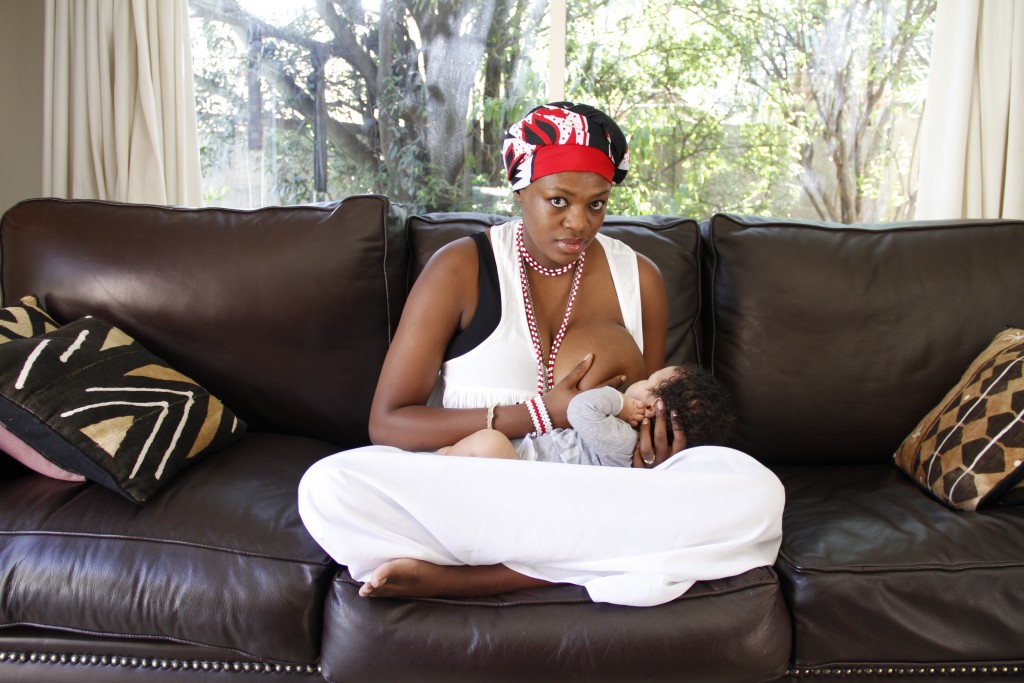A Young
South African
Sangoma Talks
Beyoncé and
Balancing Life
as a Healer
BY LUSO MNTHALI
When I first asked Gogo* about the spiritual imagery in Beyoncé’s Lemonade, I got an answer unlike anything else I knew I was going to read. Firstly because it was passionate, lovely writing and secondly it was exactly like going to the source. I thought here at least is an African traditional healer who is accessible and who could make sense of some of the imagery in the visual album. When I read Nokulinda’s blog post I understood the imagery much more. I asked this young, hip sangoma, who is a former model and is now a wife and mother as well, a few questions about ubungoma* and her life and loves.
LM: What was it like when you went for ukuthwasa* and how did your family react to your calling?
NM: The practice of ubungoma has been eroded and compromised by the colonial gaze that’s forced practitioners into the shadows where things aren’t as regulated and respected as they once were. Ubungoma is also a very dynamic yet guarded practice so it’s not an easy place for a parent of a young womyn to just let their child “go”. There are many dangers and risks in the process and also in trying to reintegrate into your community and society in general. Despite all their fears for me, my whole family came together to support my intwaso*. They visited, brought water, firewood, etc. They paid for all the ceremonies and attended them (some travelling long distances to be there with me) My parents both are doctors and come from a long line of healers so it wasn’t a total surprise that they gave birth to sangoma.
LM: In one of your videos you have a lovely explainer about how you are this normal Joburg ghel, married, a mommy and also isangoma. It was a good way for me to see how you blend the complexities of a modern sangoma. It was a window for me to see how shamanic culture (is that the right word?) is in the every day and though extraordinary, shouldn’t be seen as so outside every day lived experiences.
NM: It would just be ubungoma – shamanic has those problematic anthropological tentacles attached to it.
LM: How does being isangoma affect your every day life as wife and mother, and how do your persinal pesin and your little ones react or not to your being isangoma?
NM: Being isangoma is a trip. Every day I encounter ascended beings, ancestral spirits and I am affected by the force of life in daily things but I have been walking this path for so long (since my teens even though I was only initiated at 23) that it’s second nature to me. I asked my husband what he thinks and his view is that all the aspects of my spiritual calling are so integrated into the rest of my flesh-life that there’s nothing unusual or difficult to it.
My kids play in our msamo (sacred family space, altar) my husband burns impepho*, we make offerings, and commune with amadlozi* (it’s called ukuphahla). Tim’s also quite intuitive and attuned – it’s great because we connect really deeply and he’s an intuitive and supportive partner – so necessary for my path.
He says at first there were things that were initially outside of his realm of experience like me seeing spirits or channeling ancestral energies and seeing the physical impact of that, but he’s used to it now.
LM: In your blog post about Lemonade, so aptly entitled This Lemonade Tastes Like Medicine, you said we’re entering a time of healing as black women. What is this time called, according to the spirit world?
NM: There is no specific name for this time I speak of, I think it’s something that is constantly occurring, and each generation has this experience. Black womynhood is constantly being tested and undermined and every generation lives to fight and overcome in overt and subversive ways. What’s interesting for me is that black womyn are more acutely aware of this because we have sharing mechanisms and access to resources to disseminate information and our experiences at will.
LM: What is the best thing about being isangoma?
NM: The best thing about me being isangoma right now is entering a new phase of initiating other izangoma. I just got my first thwasana a few weeks ago. It’s surreal and humbling. Otherwise, I love the gifts I have – connecting with the spirit world, the gift of divination and clairvoyance. The gift of medicinal healing. It’s all amazing, being a bridge for people to access higher realms and healing.
Glossary:
Amadlozi – ancestors
Gogo – grandmother
Imphepho – a sacred, fragrant medicinal herb from the Asteraceae (sunflower) plant family, genus Helichrysum, species odoratissimum
Intwaso – the process of training a twasa or trainee sangoma goes through to become isangoma (healer)
Ubungoma – divination and traditional Zulu (isintu) healing practice
Ukuthwasa – the period of initiation that one undergoes in order to become a sangoma
Gogo is on a break right now and is not open for consultation at the moment.
She can normally be reached on Twitter @noksangoma, on YouTube as well as Instagram and her website.

